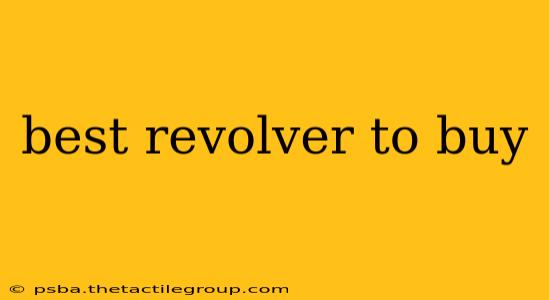Choosing the best revolver depends heavily on your intended use. Whether you're a seasoned shooter, a first-time buyer, or somewhere in between, understanding your needs is crucial before making this significant purchase. This guide will break down the key factors to consider and offer recommendations for various scenarios. We'll cover everything from caliber and action type to barrel length and overall build quality.
Factors to Consider When Choosing a Revolver
Before diving into specific models, let's examine the critical aspects that influence your decision:
1. Intended Use:
- Self-Defense: For personal protection, a compact, lightweight revolver chambered in a powerful, readily available cartridge like .38 Special or .357 Magnum is ideal. Ease of concealment and quick draw are paramount.
- Target Shooting: Accuracy and precision are key here. A revolver with a longer barrel (e.g., 6 inches or longer), adjustable sights, and a smooth trigger pull is preferred. Consider calibers like .22 LR for economical practice or .38 Special/.357 Magnum for more substantial recoil.
- Hunting (Small Game): A revolver in .22 LR or .22 Magnum is suitable for small game hunting, emphasizing accuracy and manageable recoil.
- Hunting (Larger Game): For larger game, a more powerful cartridge like .44 Magnum or .45 Colt is necessary. However, recoil will be significantly higher.
- Collection: If collecting is your goal, factors like historical significance, rarity, and condition become more important than practical considerations.
2. Caliber:
The caliber refers to the diameter of the bullet. Popular revolver calibers include:
- .22 LR: Inexpensive ammunition, low recoil, ideal for target practice and small game.
- .22 Magnum: More powerful than .22 LR, offering better stopping power for small game.
- .38 Special: A versatile round with manageable recoil, suitable for self-defense and target shooting.
- .357 Magnum: More powerful than .38 Special, offering increased stopping power but with greater recoil. It can also fire .38 Special rounds.
- .44 Magnum: A very powerful cartridge known for its stopping power, but with significant recoil.
- .45 Colt: Another powerful round with a long history, offering substantial stopping power.
3. Action Type:
- Single-Action: The hammer must be manually cocked before each shot. Generally, these are more accurate but slower to fire.
- Double-Action: Cocking the hammer and firing the round are done with a single trigger pull. Faster for multiple shots but potentially less accurate.
- Double/Single Action: Combines the features of both single and double-action revolvers, offering flexibility.
4. Barrel Length:
Barrel length affects accuracy, velocity, and recoil. Longer barrels generally offer greater accuracy and muzzle velocity, while shorter barrels are easier to conceal and handle.
5. Build Quality and Materials:
Look for revolvers made from durable materials like stainless steel or high-quality alloys. Examine the fit and finish – a well-made revolver will have tight tolerances and a smooth action.
Revolver Recommendations (General):
It's impossible to declare one revolver definitively "the best" without knowing your specific needs. However, reputable manufacturers consistently produce high-quality revolvers. Consider researching models from brands like Ruger, Smith & Wesson, Colt, and Taurus.
For Self-Defense: Look for compact revolvers in .38 Special or .357 Magnum with a lightweight design and easy-to-use controls.
For Target Shooting: Consider a larger-framed revolver with a longer barrel in .22 LR, .38 Special, or .357 Magnum, prioritizing accuracy and trigger feel.
Disclaimer: This information is for educational purposes only. Always consult with a firearms expert and follow all applicable laws and safety regulations before purchasing or handling any firearm. Proper training is essential for safe and responsible gun ownership.

